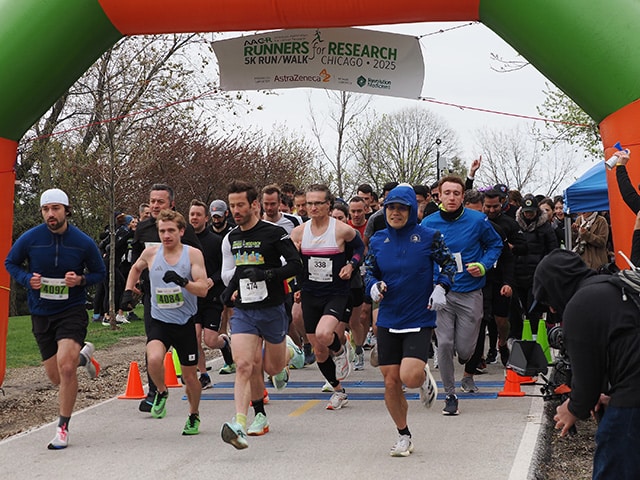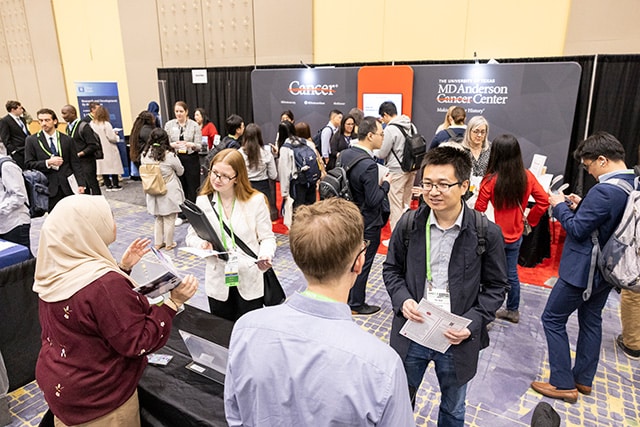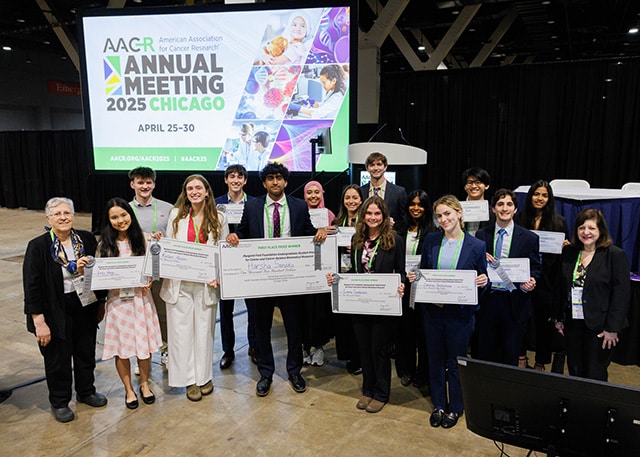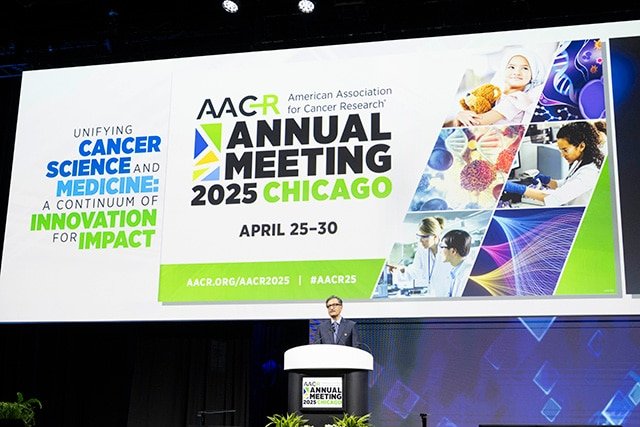After a day of Educational Sessions at the AACR Annual Meeting 2025, the second day kicked off with a 5K run/walk, welcomed job seekers to a career fair, concluded the Educational Program, and examined cancer evolution during the first Plenary Session. Read on for the takeaways from Saturday, April 26 to get a flavor of today’s offerings and keep an eye on Cancer Research Catalyst, the official blog of the AACR for more in-depth coverage of some of the cutting-edge science being presented at the AACR Annual Meeting 2025.
Discovery Science Plenary Explores Cancer Evolution
“A theme running throughout this year’s AACR Annual Meeting is how fundamental science is really transforming opportunities now and in the future,” said Ashok Venkitaraman, MBBS, PhD, FAACR, the chair of the “Discovery Science Plenary: Novel Mechanisms Influencing Cancer Evolution,” which provided insightful perspectives on several aspects of cancer biology that are central to the puzzle of cancer.
“Understanding how cancers evolve in different tissue is really at the heart of better approaches to clinical management,” added Venkitaraman, who is from the National University of Singapore.
Starting off, Inigo Martincorena, PhD, of Wellcome Sanger Institute, spoke about how mutations arise independently in different cells and contribute to somatic mosaicism and tumor heterogeneity. Moving to metabolism, M. Celeste Simon, PhD, FAACR, of the University of Pennsylvania Perelman School of Medicine, explored approaches to targeting metabolic vulnerabilities in kidney cancer that might also be applicable to other types of tumors. Yang Shi, PhD, FAACR, of the Ludwig Institute for Cancer Research, shared strategies for manipulating cancer cell signaling via epigenetic alterations, in order to force leukemia cells to differentiate and mature, thereby neutralizing their aggressive growth. Wrapping up the session, Nicola Segata, PhD, of the University of Trento, provided the audience with an in-depth look at how a better understanding of the human microbiome might enable us to improve the way we diagnose and treat cancer.
Educational Program Wraps Up
More than 65 Educational Sessions and Methods Workshops comprised this year’s Educational Program, which will remain available for on-demand viewing on the virtual meeting platform through October 2025 for anyone with an Educational Program Pass.
“We tried to build an Educational Program that broadly covers the interests of attendees, who we hope will take advantage and get out of their comfort zone a little bit and learn about another field that they’re curious about,” said Matthew G. Vander Heiden, MD, PhD, one of the AACR Annual Meeting 2025 Program Committee chairs and the Education Committee chair.
Vander Heiden, of the Koch Institute for Integrative Cancer Research at MIT and the Dana-Farber Cancer Institute, explained that the Program Committee wanted to highlight the early detection theme across the meeting, including in several sessions within the Educational Program. An “Early Detection of Primary Cancer and Minimal Residual Disease by Liquid Biopsies” session featured discussions on using liquid biopsy to diagnose primary cancers and detect recurrences earlier, while a session on “Cancer Predisposition in Childhood Cancer” examined the impact of multimodal early detection approaches on survival and explored the present and future of cancer interception.
Other sessions tackled topics like extrachromosomal DNA in cancer, the evolution of cancer hallmarks, how GLP-1s may impact cancer care and prevention, utilizing AACR Project GENIE for real-world clinico-genomic data, and the application of artificial intelligence to advance cancer research.
View all of the Educational Sessions and Methods Workshops on the Online Itinerary Planner and catch up on any topics of interest you may have missed.
Runners Raise Funds for Cancer Research
Attendees showed their unwavering support for cancer research by arriving bright and early at the Firefighter & Paramedic Memorial for the AACR Runners for Research 5K Run/Walk. The more than 850 runners—with over 60 teams—included cancer scientists, survivors, advocates, and others interested in raising money to support cancer research. Whether they chose to run or walk, all enjoyed the chance to experience some of Chicago’s stunning lakeside views. Their efforts also lead to more than $273,000 in donations that will help advance research for the millions affected by cancer worldwide. The top fundraising team was AstraZeneca ($4,645) and the top fundraising individual was Christine Coticchia ($1,200). Meanwhile, the Best Team Spirit prize went to the Chicago Hoyas (who are all Georgetown alumni).

Regulatory Science and Policy Sessions Discuss Early-onset Cancer and Clinical Trial Representation
The first two regulatory science and policy sessions of the AACR Annual Meeting took place on Saturday. In “Bridging the Gap: Ensuring a Broad Representation of Patients in Cancer Clinical Trials,” the panelists spoke of the urgent need to implement frameworks that can help those in underrepresented groups and minority populations overcome the multifaceted barriers they often face when attempting to participate in clinical trials.
Several of the panelists provided examples of how they or their institutions are working to address these issues. Dario R. Roque, MD, of Northwestern Feinberg School of Medicine, created Empact Chicago, an online tool to help patients find clinical trials for gynecological cancers in the city of Chicago. Bianca Islam, MD, PhD, of Case Western Reserve University/University Hospitals Cleveland Medical Center, spoke about the UH Mobile Research Unit, which is a mobile laboratory that helps increase trial diversity by bringing trials into underserved communities. Poorna Kushalnagar, PhD, of Gallaudet University, described the lack of representation of individuals with sensory disabilities and her goal to change that with Consent-ASL. This platform uses computer vision and AI technology to explain clinical trial informed consent through American Sign Language.
In the other session, “Rising Rates of Early-Onset Cancers: Understanding the Shift and Exploring Policy Solutions,” panelists addressed some of the critical questions about early-onset cancers and the answers that are still needed.
Zsofia K. Stadler, MD, of Memorial Sloan Kettering Cancer Center, spoke about the germline genetic susceptibility for some forms of early-onset cancer and the need to develop a standardized definition for what constitutes early-onset for each cancer type. Ulrike (Riki) Peters, PhD, MPH, of Fred Hutchinson Cancer Center, discussed how genetics cannot alone explain the rise of early-onset cancers, but more research is needed into potential causes related to gene-environment interactions. Andrea Cercek, MD, of Memorial Sloan Kettering Cancer Center, joined Manju George, PhD, DVM, who is a rectal cancer survivor, to provide the clinician-patient perspective and how cancer patients in their 20s and 30s are also concerned with issues like fertility, sexual health, and financial toxicity. John B. Wong, MD, MACP, offered the policy perspective and what goes into revising the U.S. Preventive Services Task Force (USPSTF) cancer screening guidelines.
Mentorship Speed Dating, Leadership Training for Women in Science, and More Professional Development Opportunities
The AACR Cancer and Biomedical Research Career Fair featured 17 exhibitors from academic cancer institutions, the pharmaceutical industry, and other scientific organizations. If you couldn’t make it to the career fair, the CancerCareers.org Hub will be open at AACR Central in the Exhibit Hall Sunday through Wednesday.

Three of the meeting’s nine Professional Development Sessions were held on Saturday, including a “mentorship speed dating” opportunity where early-career AACR Associate members got to have 15-minute one-on-one conversations with distinguished cancer researchers, including AACR Past Presidents Elizabeth M. Jaffee, MD, FAACR, and Michael A. Caligiuri, MD, FAACR. Meanwhile, the AACR’s Women in Cancer Research (WICR) constituency group partnered with Pelotonia on an opportunity for women in science at all stages of their careers. The “Women and Power: Building Personal Resilience and Responding Dynamically to Stressors Over Your Career Lifetime” workshop, which was sponsored by The Victoria’s Secret Global Fund for Women’s Cancers, offered a talk as well as small group exercises to help empower attendees to enact changes that will decrease their stress levels and strengthen their connection with women colleagues.
Finally, the 20th Annual Undergraduate Student Caucus and Poster Competition welcomed college students to a full-day event focused on networking, career advancement advice, and scientific discussion. In addition to a career panel and remarks by prominent researchers, including Vander Heiden and John M. Carethers, MD, FAACR, from the University of California San Diego, the festivities included a poster presentation in which more than 150 students presented their research.
A judging panel consisting of AACR members selected a cohort of winners who were presented with prizes courtesy of the Margaret Foti Foundation. Margaret Foti, PhD, MD (hc), chief executive officer of the AACR, awarded a first-place prize to Harsha Sanaka, second place prizes to Emma Sanderson and Rachel Mason, and third place prizes to Emily Wang and Caroline Greenstone. Ten meritorious honors were also awarded.
“Students like you are the future,” Foti said. “Whether you are receiving a prize today or not, I urge you to think about your goals and your intended educational programs going forward, because we need people like you along the pathway of cancer research to save more lives.”
If you’d like to congratulate the poster competition winners, they will be presenting their work in the main poster hall Monday, April 28 from 9 a.m. to 12 p.m. CT alongside 22 AACR Undergraduate Scholars. For more about the activities planned for this year’s high school and undergraduate students, read the blog post previewing the programs.

Learn more about the Professional Development Sessions and some of the sessions still to come on Monday and Tuesday.
Visit the virtual platform to view any of the scientific sessions or e-posters through October 2025. Follow AACR Annual Meeting News and subscribe to Cancer Research Catalyst for more coverage of the meeting.

